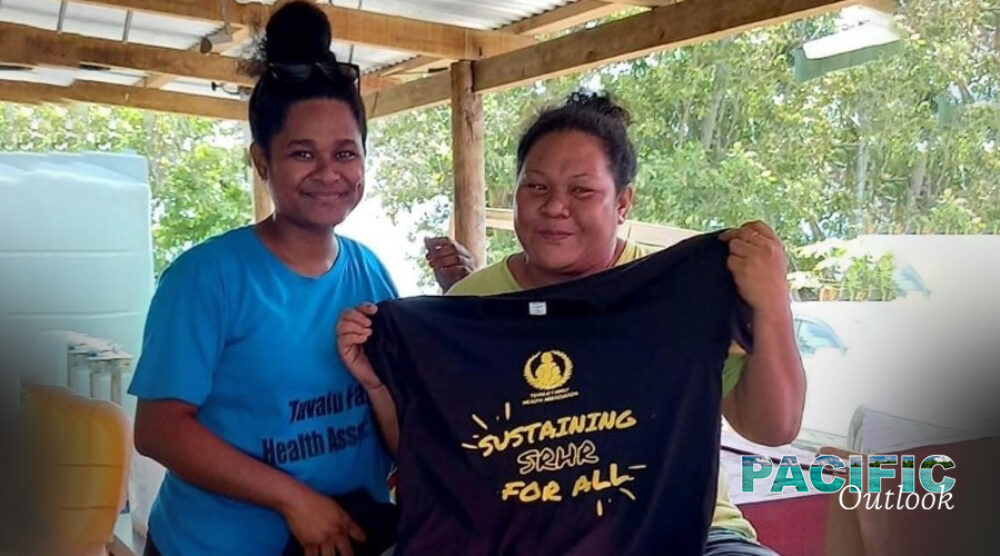Tuvalu is the fourth smallest nation in the world and one of the most affected by the impacts of climate change. Though the physical impacts of climate change are evident with things such as sea level rise, disappearing islets after a tropical cyclone, sand degradation, etc., what has been silently plaguing Tuvaluans is the impact climate change has on health and, in particular, sexual reproductive health and rights (SRHR).

SRHR is a sensitive topic in Tuvalu and it is challenging to carry out awareness programs on the subject. This is not only difficult in the capital, Funafuti, but also on the other eight outer islands. With a population of just over 10,000 people, SRHR is categorised as ‘taboo’ amongst these close-knit and traditional communities so that health service providers both at the non-governmental and government agencies share their difficulties with one another when carrying out their work of providing information and clinical services on SRHR to all Tuvaluans.
During my tenure with the Tuvalu Family Health Association (TuFHA), the only NGO to provide SRHR information and services, I observed that most of the time, the community members are more concerned with addressing their sexual health when pain is apparent rather than taking heed of the preventative methods. Therefore, holding discussions around sexual reproductive health and making informed decisions about sexual health often attracts negative connotations that result in assumptions such as the promotion of ‘sex before marriage’, ‘birth control is against the Bible that encourages procreation’ and ‘those who use birth control are loose women’. There is a misperception that SRHR is only for women and does not concern men.
We are coexisting with and living through the impacts of climate change, where words such as adaptation and resilience are overused to generate some form of hope that climate change can be controlled and can be slowed down. We have been adapting in our own ways across the various sectors of the communities and in our lives for years. We are more than resilient, the new generation will not see sea level rise as anything out of the ordinary, this has all become our new reality!

Despite living in this reality of facing the impacts of climate change every day and progressively realising many other social-economic concerns that need to be addressed, we are still faced with cultural taboos like SRHR. Though we have platforms to advocate for SRHR the typical mindset is to shy away from discussing this openly or supporting the work around SRHR. The most vulnerable and marginalised groups such as women, children, youth, elderly, LGBTQI and people living with disabilities face challenges around their livelihood, mobility and decisions that most of the time have been made about them without them. This has only increased due to the climate crisis we are facing.
The unreported and undiscussed rise in numbers of the pregnant girl-child, single mothers, unplanned pregnancies and sexual transmitted infections (STIs) has not encouraged more open discussions of SRHR. The failure to understand the information on SRHR and its importance and to use this information to make informed decisions is an area of concern that TuFHA has been trying to bridge.
The existing challenges around the accessibility of contraceptives, sexual healthcare, gender-based violence (including sexual violence) and domestic violence counselling services) are heightened around times leading to, during and after natural disasters.
Many climate change projects around climate mitigation and adaptation undertaken in Tuvalu do not emphasise or elaborate on the link between water sanitation, health, gender and SRHR. The past and current projects are carrying out their own mandates and implementing activities that could be entwined with SRHR to reiterate its importance. If there was the opportunity to be more inclusive in our policies, in the projects we bid for and around incorporating SRHR into existing projects, I believe that this will allow a holistic approach to dealing with the impacts of climate change on Tuvaluans.
The discussions around gender inclusivity, the strengthening of partnerships between government agencies & civil society and mainstreaming gender in the annual budget need to be prioritised to allow subjects like SRHR to be included. To be able to have access to information and services around SRHR without the fear of being stigmatised and ostracised will lead to a progressive move towards healthier minds, informed choices and healthier bodies to live with and combat the daily impacts of climate change. In the words of Marcia Garber a supportive mother of a transgender child and sexual health:
“All people deserve accurate sexual health care”.

Teresa Lifuka-Drecala is a Tuvaluan student under the DFAT Australia Awards program, completing her Masters in Law and Development at the University of Melbourne.








